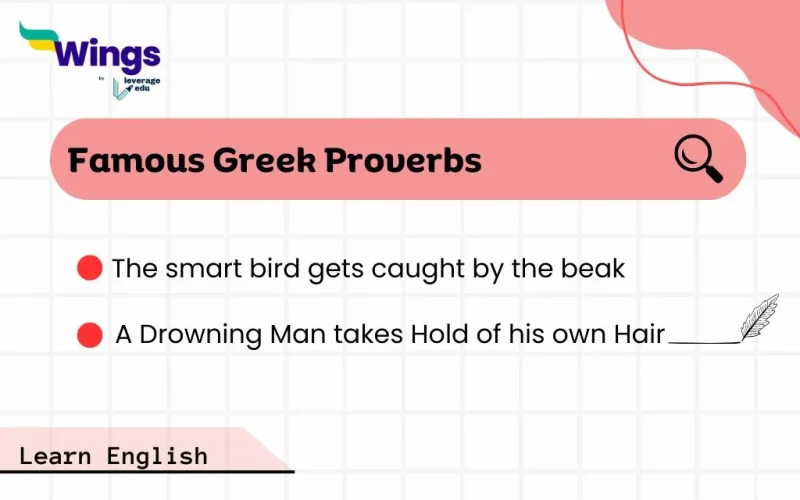Greek proverbs reflect the experiences and beliefs of the Greek people, providing insights that have been passed down through generations. Each proverb carries a specific meaning and can be used in various situations to convey advice or wisdom. For example, the proverb ” A good captain proves themselves in a storm” means that a person’s true abilities and character are revealed during challenging times. In this blog, we will look at several such Greek proverbs, their meanings, and examples of how they can be applied in everyday life.
This Blog Includes:
- Popular Greek Proverbs in English
- Top Greek Proverbs with Meaning & Examples
- Too Many Opinions Sink the Boat
- Many words are Poverty
- The Donkey Called the Rooster Big-Headed
- Unripe Grape Gets Sweet As Honey, At A Slow Pace
- When the Cat’s Away, the Mice Will Dance
- It is difficult to argue with the belly, as it has no ears.
- My Home, my Little Home, a Little House of my own
- The Crow does not take the Eye out of another Crow
- A Drowning Man takes Hold of his own Hair
- A Curse is like a Donkey; it returns to its Master
- Classic Greek Proverbs that Have Stood the Test of Time
- FAQs
Popular Greek Proverbs in English
Greek proverbs offer timeless wisdom, explaining complex ideas in simple and memorable phrases. These sayings reflect the culture and values of ancient Greece and continue to resonate with people today. From the importance of clear communication to the human tendency to criticise others while overlooking their own flaws, these proverbs provide insightful ideas on life and human nature.

Top Greek Proverbs with Meaning & Examples
Here are some of the most common and popular Greek proverbs that one should knowin their daily use. The proverbs are with their meanings and examples.
Too Many Opinions Sink the Boat
Meaning: The Greek proverb “Too many opinions sink the boat” means that it is difficult to make good decisions or take effective action when there are too many conflicting opinions and ideas being expressed
Example: During the meeting, everyone shared their thoughts, but I reminded them that too many opinions sink the boat, and we needed to choose one plan.
Many words are Poverty
Meaning: “Many words are poverty” suggests that excessive talk or rambling can lead to confusion and may weaken the message. It means that sometimes less is more and that clear, concise communication is often more effective than a lot of unnecessary words.
Example: When discussing important topics, remember that many words are poverty; try to be clear and concise.
The Donkey Called the Rooster Big-Headed
Meaning: This proverb highlights the irony of someone attacking another for a fault that they possess. It serves as a reminder that people often point out the flaws of others while being blind to their shortcomings. This is similar to the English expression “the pot calling the kettle black.”
Example: During a discussion about work ethic, Maria said, “I can’t believe John is criticising my time management. It’s like the donkey calling the rooster big-headed!
Also Read: 100+ Common Proverbs with Meaning and Examples
Unripe Grape Gets Sweet As Honey, At A Slow Pace
Meaning: The proverb “Unripe grape gets sweet as honey, at a slow pace” means that good things take time to develop. Just like an unripe grape needs time to ripen and become sweet, some situations or achievements require patience and gradual progress.
Example: Learning a new skill is like an unripe grape; it gets sweet as honey, at a slow pace. I need to be patient with myself.
When the Cat’s Away, the Mice Will Dance
Meaning: The phrase “When the cat’s away, the mice will dance” means that when someone in charge is not present, those who are usually under their control will take the opportunity to act freely or misbehave. It suggests that people may take advantage of the absence of authority to do things they normally would not do.
Example: The students started talking and laughing when the teacher left the room. It was clear that when the cat’s away, the mice will dance.
It is difficult to argue with the belly, as it has no ears.
Meaning: “It is difficult to argue with the belly, as it has no ears” means that when someone is hungry, they cannot focus on anything else, including discussions or arguments.
Example: My person suggested discussing the day’s events. Another friend replied, “It is difficult to argue with the belly, as it has no ears. Let’s eat first, then talk.”
My Home, my Little Home, a Little House of my own
Meaning: “My home, my little home, a little house of my own” expresses a deep affection for a personal space that feels cosy and intimate.
Example: After a long day at work, I love coming back to my home, my little home, a little house of my own where I can relax and unwind.”
The Crow does not take the Eye out of another Crow
Meaning: “The crow does not take the eye out of another crow” is a proverb that suggests that members of the same group or community tend to avoid harming or betraying one another.
Example: In the small town, everyone knows everyone, and they stick together. As the saying goes, “The crow does not take the eye out of another crow.”
A Drowning Man takes Hold of his own Hair
Meaning: “A drowning man takes hold of his own hair” is a Greek proverb that conveys the idea of someone in a desperate situation looking for extreme measures to save themselves.
Example: “When the company was on the brink of bankruptcy, the CEO tried to secure a last-minute loan, but it was a case of a drowning man taking hold of his own hair.”
A Curse is like a Donkey; it returns to its Master
Meaning: “A curse is like a donkey; it returns to its master, which means that negative words or actions directed at someone often come back to affect the person who began them.
Example: He learned the hard way that a curse is like a donkey; it returns to its master when his negative comments about others come back to haunt him.
Also Read: Common Bengali Proverbs
Classic Greek Proverbs that Have Stood the Test of Time
Learning Greek proverbs can also help you understand more about Greek culture and the way people think in Greece. Refer to the below proverbs to know more:
Moderation in Everything
Meaning: The phrase “moderation in all things” means avoiding excess and maintaining a balanced approach in various aspects of life is best. It suggests that doing too much or too little of anything can lead to negative consequences, so it is wise to practice moderation.
Example: I enjoy dessert, but I believe in moderation in all things, so I only have a small piece.
The smart bird gets caught by the beak
Meaning: The proverb “The smart bird gets caught by the beak” suggests that sometimes, being clever or too smart for your own good can lead to trouble or consequences. It implies that intelligence or cunning can backfire, resulting in unexpected problems.
Example: She tries to impress the interviewer with her clever answers, but the smart bird gets caught by the beak, and she ends up saying something wrong.
Whoever does not have their brain/mind has their legs
Meaning: The phrase “Whoever does not have their brain/mind has their legs” signifies that those who are not thinking or using their intellect may end up in trouble or face consequences. It indicates that without proper thought or consideration, one may find themselves in difficult situations.
Example: If you don’t study for the exam, remember that whoever does not have their brain has their legs, you might fail and have to retake the class.
The camel doesn’t look at its hump
Meaning: “The camel doesn’t look at its hump” signifies that people should not focus on their flaws or shortcomings. Instead, they should appreciate their strengths and what they have. It suggests that one should not be overly critical of oneself.
Example: Even though I have some flaws, I try to remember that the camel doesn’t look at its hump and focus on my strengths.”
FAQs
A proverb is a well-known saying that expresses a common truth or piece of wisdom. For example: Examples include “Actions speak louder than words,” which means what you do is more important than what you say, and “Birds of a feather flock together.”
The famous Greek quote is “What you leave behind is not what is engraved in stone monuments, but what is woven into the lives of others.”
Aristotle once said that without courage, you can’t accomplish anything in life. He believed that courage is the most important quality of the mind, right after honour.
Read more related blogs on Proverbs
This was all about the Meaningful Greek Proverbs with Examples and Meaning for you. Hopefully, you understood the concept and where it’s used. Moreover, you can also follow the Learn English page of Leverage Edu for more exciting and informative blogs related to grammar.


 One app for all your study abroad needs
One app for all your study abroad needs












 60,000+ students trusted us with their dreams. Take the first step today!
60,000+ students trusted us with their dreams. Take the first step today!